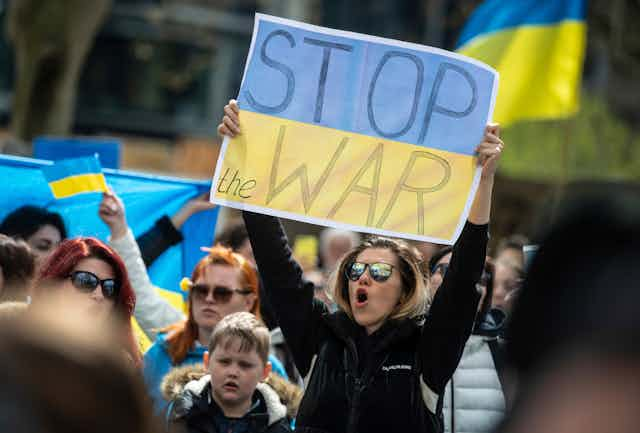Russia’s invasion of Ukraine is unlikely to be resolved on the battlefield. An end to the bloodshed and destruction of Ukraine can be negotiated, but such negotiations need to be mediated carefully.
So far, all attempts have been unsuccessful. As have been calls on Putin to end the war, from Western heads of state to the pope.
Recep Tayyip Erdoğan, the president of Turkey, is currently acting as a mediator between Russia and Ukraine. Such a situation, where a separate country or politician assumes the role of go-between, has worked to bring some past wars to an end.
But politicians aren’t always the best mediators.
Negotiations can be facilitated more actively, and ideally international experts on peace mediation should be involved as quickly as possible.
Read more: Putin is staking his political future on victory in Ukraine – and has little incentive to make peace
Peace mediation has become a profession
There have been many developments in the field of peace mediation over the past decades. The United Nations, the African Union and other international organisations have set up mediation teams.
Several specialised non-governmental organisations have also been created, like the Geneva-based Centre for Humanitarian Dialogue and the Helsinki-based Crisis Management Initiative.
Peace mediation is developing into a professional activity. There have even been initiatives to adopt a new international treaty to create a stronger framework and more guidance for peace negotiators.
Mediators are called in when a conflict is too complex for the parties to resolve by themselves, as in family disputes for instance. Trying to end wars is, obviously, very complex and requires certain expertise.

The problem in the Russia-Ukraine context is all these experienced organisations would be dismissed as “pro-Western” by Moscow. The same is true for states like Switzerland and the Nordic states, which have a long tradition as mediators.
Therefore, the current Russia-Ukraine talks are taking the form of classical diplomacy negotiations between states mediated by politicians. Professional peace mediators aren’t involved.
Politicians as mediators?
Peace mediators don’t necessarily have to be perfectly neutral and unbiased. Close relationships with one or both conflict parties may actually help.
Indeed Erdoğan has high stakes in this conflict. This doesn’t automatically disqualify him as a mediator.
Consider the role the United States, historically a strong supporter of Israel, played in brokering the 1993 Oslo Agreement between Israel and the Palestinian Liberation Organization.
Another example is the role Blaise Compaoré, the former president of Burkina Faso, played in the 2007 negotiations leading to a peace agreement between the government of the Ivory Coast and the rebellious “New Forces”, which Compaoré overtly supported.
Being able to influence and, to some extent, compel the conflict parties to negotiate can also help. A prime example is the 1995 Dayton Peace Agreement that ended the bloodshed in Bosnia-Herzegovina.
Here, the US had some leverage over the parties, which allowed the chief mediator, Richard Holbrooke, to adopt the “Big Bang approach” in which all parties are locked in a room – in this case the Wright-Patterson air force base in Dayton – until they reach an agreement.
But Russia is too powerful for that.
This is also why the Austrian chancellor’s trip to Moscow this week seems rather hopeless and possibly counterproductive at this stage. Chancellor Nehammer seems to think he can negotiate humanitarian corridors and a ceasefire.
But Putin will be able to use the visit to show Russians he isn’t that isolated in Europe (even if Austria is hardly a heavyweight). So while attempts to mediate are always laudable, they need to be planned carefully.
Fundamentally, politicians aren’t necessarily the best mediators, although they often see themselves as such, and Erdoğan is relatively well placed.
Peace mediation experts should be involved
International, professional experts on peace mediation could and should be involved in the Russia-Ukraine talks, whether formally or informally. Most peace agreements have been facilitated by third parties in some way.
For instance, the Intergovernmental Authority on Development, a regional organisation, mediated the negotiations between Sudan and South Sudan, with the contribution of other organisations and experts. This led to the adoption of the Comprehensive Peace Agreement in 2005, which ended a longstanding war.
Also, while a ceasefire is desirable, it isn’t absolutely necessary to make progress on substantive issues, such as the status of the Donbas and Crimea. Many negotiations, from Bosnia to Colombia, have been held while the fighting continued. So even if there’s no ceasefire, the parties can still agree on other issues.
And it can be OK to agree to disagree. Not everything needs to be resolved right now in a comprehensive package deal. Some issues can be resolved later. Peace is a process.
Read more: Ukraine Recap: is peace possible?
To be clear, engaging in negotiations doesn’t imply excusing Russia’s aggression or the perpetration of war crimes. And atrocities against civilians, as revealed by the recently discovered corpses in Bucha, could further decrease the chances for successful talks.
No indictments or arrest warrants against political and military leaders, including Putin, have been issued in the context of Ukraine so far. But with the situation before the International Criminal Court, this could change. While it will be difficult to execute such warrants, they’re likely to affect negotiations.
It’s crucial to explore every option to end this war right now by envisaging a scenario that allows both sides to avoid feeling humiliated. Using professional peace mediators would help. But of course they can’t be imposed on Putin.

